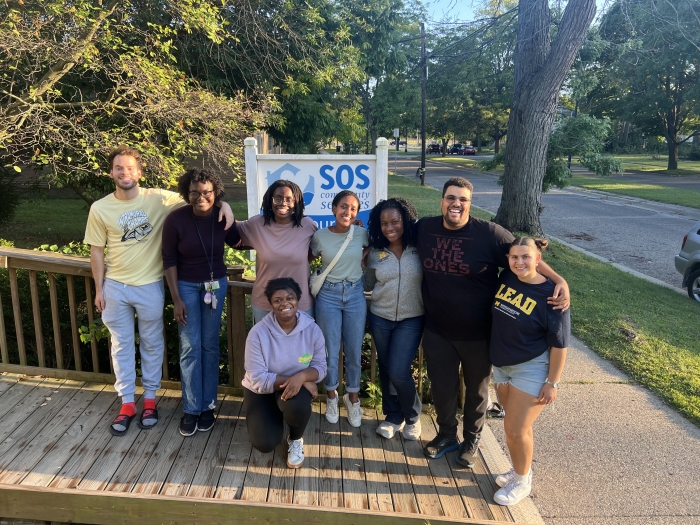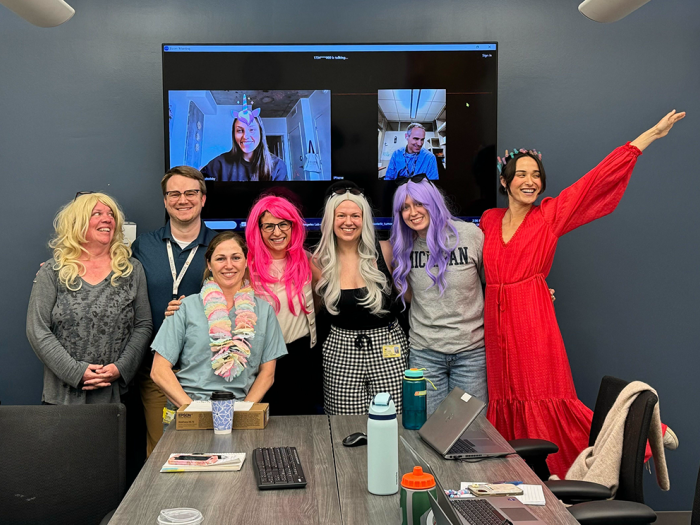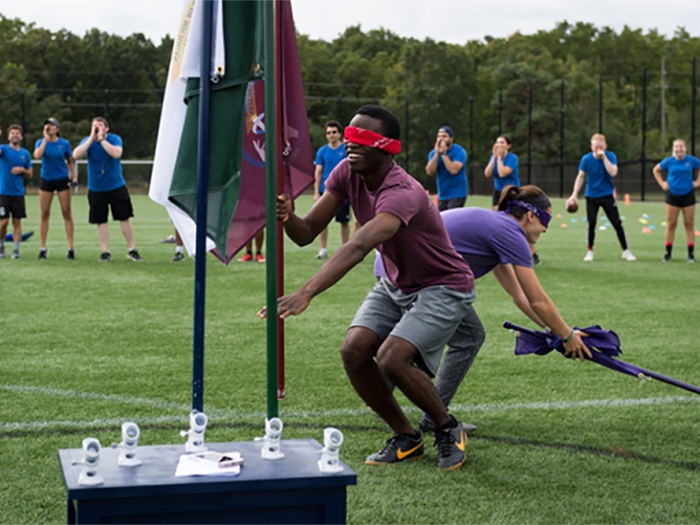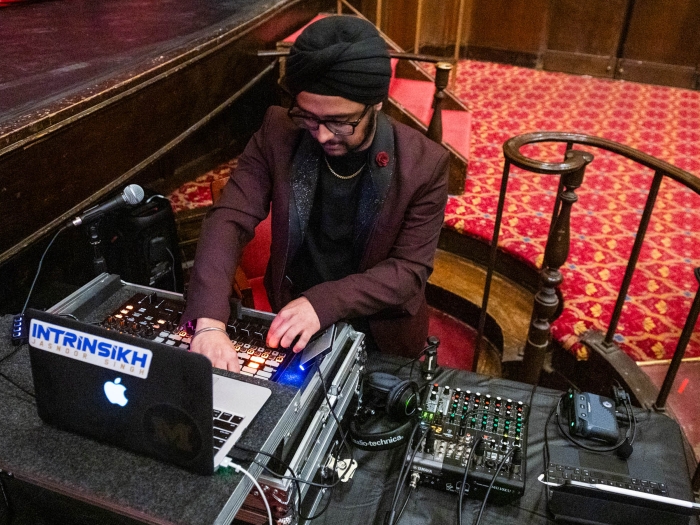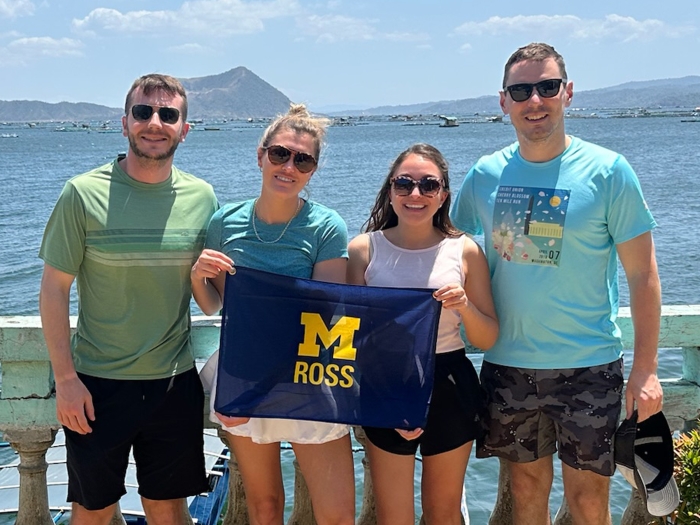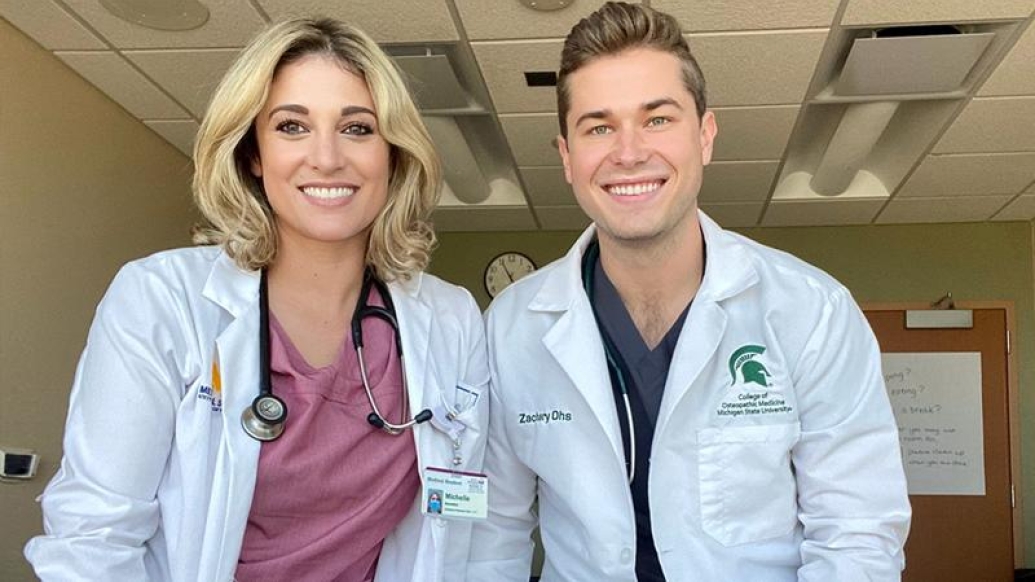
Michelle's Michigan Answer: I entered medical school wanting to be a learner AND creator, which is something I found at Michigan.
Michelle Benedict (she/her) hails from San Jose, CA, and graduated from San Francisco State University in 2008. She was drawn to University of Michigan Medical School seeking a program that would allow her to explore, innovate and find people who had a shared vision of helping the larger whole rather than self. She has found that her individual interests and passions have been nurtured through physician mentors who have opened doors and given her opportunities to explore ideas and deepen her perspectives.
With a desire to combine technology with her passion for surgery, vet new ideas and bring them to fruition with a team, she decided that an MD/MBA dual degree best suited her goals. During her time at Michigan, Michelle has found the Medical School responsive and flexible to creativity and accommodating special curricular ideas launched by students that are well-researched and address a proven need.
Her most recent work involves creating a new MBA curriculum that has led her to Tennessee, where she's currently helping a group called Remote Area Medical spread telehealth adoption for its sheltered and unsheltered populations across the state and country.
What called you to explore a career in medicine?
Like many people, I grew up seeing the inequity in how people with disabilities, disfigurement and chronic conditions are treated first-hand in my own family. When I learned at an early age about surgeons who would travel to other countries and perform free surgeries to give patients a second chance at life, I knew that was a noble pursuit that felt most purposeful to me. Through my time exploring this interest by shadowing in operating rooms all over the world, I was continually reaffirmed that it was the most special kind of service and the highest honor to get to be with and soothe patients in their most vulnerable hours. Sharing the fragility of humanity with another is perhaps one of the most vulnerable positions you can put yourself in as well, and that is a deep source of meaning for me.
What is one thing you wish you would have known before or while going through the medical school application process?
In the end, it all works out and if it hasn’t worked out yet, it’s not the end! I received many rejection letters (as do all medical students!), and I remember how much the first few stung. But at a certain point, I started to see that every “closed door” was just bringing me closer to the right open door for me. Rejection is just re-direction. As applicants we can think that a closed door is a sign that we aren’t good enough, but what I came to realize is that not all schools had the resources to support my unique interests and so it is much more a “match” process than usually gets talked about. You will end up at the exact right place for you.
Why did you decide to attend Michigan?
There is a lot of “status” and “prestige” around the field of medicine. So many times I witnessed institutions and students feel they need to talk up how great they are, which can feel pretty inauthentic. When I visited Michigan I was struck by the lack of ego: being that it is a “top” school, I was expecting the typical, “we’re #1 in this and you would be lucky to be here” but instead I was met with learning opportunities (casting on my interview day!) and open forums for diverse patient populations to share what was lacking in healthcare (even at Michigan). I was really impressed by this dedication to honesty and humility. I knew Michigan was a place I could feel safe to explore/innovate, sometimes stumble, and find people who had a shared vision of helping the larger whole rather than self.
What have been your favorite parts or features of the med school curriculum so far, and why?
One didactic year (vs. the traditional two) was tough, but it means getting three years in the hospital (vs. the traditional two), and I think this is a huge advantage in figuring out your path and getting more clinical experience to be prepared to match into residency.
What is your Path of Excellence, why did you choose to pursue a path, and what have you enjoyed most about taking part in a Path?
I am in the Innovation & Entrepreneurship Path, and I chose this because of the mentors who lead it. Through this Path I was exposed to like-minded peers who have become some of my closest friends and repeat co-authors. My mentors connected to this Path have so much great experience, perspectives and connections that have afforded me many opportunities as a medical student to participate in and publish research for which I am incredibly grateful.
How have your experiences at Michigan led you to choose your specialty for residency and what advice do you have around choosing a specialty?
I had a strong inclination towards Plastic & Reconstructive Surgery (PRS) going into medical school, but I was made to promise that I would keep an open mind. As an M1 in the didactic curriculum I was itching to get into the operating room as soon as possible. By reaching out to and through different Michigan mentors I was able to scrub into many surgeries in several different subspecialties even as an M1, which I think was important for connecting concepts I was learning in didactics and getting an early start on analyzing different surgical cultures. Ultimately, I confirmed PRS is the right specialty for me because of: the patient populations they serve, the variety of surgeries (all over the body vs one area), the strong mentorship in the department across all faculty, and the highest pursuit of precision/perfectionism/attention to detail that is inherent to this field specifically.
My advice around choosing a specialty would be to keep a log of what you like/dislike about different rotations to see trends that emerge around the types of problems you like to solve and patient populations that feel most meaningful to you. Sometimes people say that each subspecialty is its own “tribe” and to find the people most like you, but I have found incredible mentors in other complementary specialties too (OMFS, ENT, Anesthesia) that I believe will make me a more well-rounded plastic surgeon. I think you will find personalities that reflect (and don’t reflect) your values in any specialty, so it’s important to look at people as individuals (vs. representative of entire specialties per se) and keep note of the traits you’ve witnessed that you’d like to embody someday (whether by positive or negative observation).
Why did you decide to earn a dual degree while in med school, what has the experience been like, and what advice do you have for others who are considering a dual degree in medical school?
I chose to pursue a MD/MBA dual degree because I have a strong interest in surgical innovation. While medical school teaches you to be an excellent clinician, it does not teach you how to vet new ideas and bring them to fruition with a team. I knew that a business degree would be vital to my future vision of being able to see problems firsthand as a surgeon and have the training in inventing solutions to solve them.
In fact, I’m currently in Tennessee through the Michigan Ross MBA program, helping a group called Remote Area Medical spread telehealth adoption for its sheltered and unsheltered populations across the state and country. It is brand new MBA curriculum they allowed me to pitch and that got approved/funded/staffed! We are on-site doing patient journey discovery directly with patients, providers, volunteers and staff.
My advice is that pursuing a dual degree is not always a favorable path that everyone looks at as positive. Although business courses teach the highest level of thinking in operations, strategy, people management, etc. (which have very real applications every day in academic medicine settings), some clinicians will be skeptical about your dedication to becoming a practicing physician if you have another degree entirely. This is why it’s important to have a strong, honest “why” for your dual degree that you can explain repeatedly to medical decision makers, because you will have to.
What are some of the health disparities, health equity and/or social justice work you’ve become involved in at Michigan?
I have found my time with Wolverine Street Medicine (WSM) so fulfilling. WSM provides free medical care to the unsheltered communities around Detroit, in addition to other services ranging from food security, vaccination and clothing/warmth drives. I think it’s very important to contribute in any community you find yourself in and, being originally from the San Francisco Bay Area, there is tremendous need to care for unsheltered patients in every city. There are special medical challenges in Detroit because of the winter conditions in the Midwest for a person without shelter. I have learned so much about meeting people where they are, caring for all patients with respect and dignity, and navigating very complex socioeconomic and mental health barriers to care.
What research activities have you become involved in at Michigan?
I have been so fortunate to participate in research every year throughout medical school in a field I am passionate about: the evolution of advanced technology into clinical spaces. I come from a technology background, formerly a Project Manager at Apple in the Machine Learning department. When I started at Michigan, I wanted to find a way to bring a competency of mine (technology) into my passion of surgery. I think this strategy of finding the overlap between “who I am/what I know” with “who I want to be/what I want to learn” has been helpful in gaining depth and informing a more articulate vision for my future.
But, there are many other ways to approach research, if you’re even interested in research at all. The best first step is to find mentors who believe in you and will help you grow. At Michigan, there is no shortage of research opportunities and mentors who will educate and sponsor you if you only ask!
What are the ways in which you’ve been able to explore your passions during med school, and what resources or people have helped you do so?
There are so many opportunities to explore different passions from the first day you open your umich inbox that it can in fact be rather overwhelming! I think the best tip I can provide is that, at the end of the day, it is important to have a reputation for delivery on your commitments because this is how people will come to know they can depend on you for future opportunities. That being said, my strategy from day one was to only commit to opportunities that felt like a “100% yes” or as Marie Kondo says, “spark joy” because those are things you are most likely to give your full energy toward. Anything that didn’t meet that bar was filed for later. So step 1 of exploring my passions was being deliberate and intentional about opportunities.
As a project manager at Apple, the most important framework for delivery was identifying the box of “scope, time, resources” and communicating that with others so success/expectations are defined and can be delivered against. So step 2 of exploring passions is about getting collective clarity from the beginning on what commitment looks like in terms of activity, timeline and team members.
Step 3 is to jump in, explore, problem solve, connect with others, feel the joy, fine tune, reflect, repeat. Of course you don’t have to follow any sort of algorithm for exploration, but I would just caution against saying yes to everything and being unable to deliver to those that count on you.

